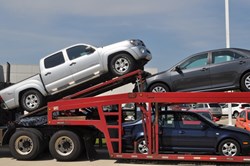Car Shipping Services
What You Need to Know to Make a Smart Car Shipping Choice 
So you’ve made the decision to ship your car. Now what?
Car shipping is a smooth process if you educate yourself on each step of the car shipping process. That’s why we’ve put together this overview on the basics of car shipping. In just a few minutes, you can get a detailed explanation of how the process works and how you can prepare to make the right decision.
So let’s jump in and explore 4 basic questions, you must have answered before you choose a car shipper.
Who Are the Auto Shippers? What Do They Really Do?
The auto shipping industry has two main players:
- Car Carriers They’re the ones with the double-decker trucks that actually move your car to the desired destination. You can hire them directly or through a middleman. If you hire them directly, you can limit your options as they may only specialize in one vehicle type. You also remove price competition from the process. So it’s always smart to get multiple quotes from a handful of direct carriers before you make your decision.
- Auto Transport Agents/Brokers Agents hire the carriers and facilitate the move (but they don’t own the trucks). Many folks use brokers because they perform the task of finding the most secure and reliable carriers. Plus, they remove the headache of car shipping since they already have relationships with the best auto transporters. They also create competition between the carriers, meaning you’re more likely to get a carrier’s best offer. Brokers also know the strengths and weaknesses of specific carriers and can help you find specialty shippers if you have a vehicle that is not a car, truck or SUV.
What Should I Look for in an Auto Transport Company?
If you know what to look for, hiring a vehicle transporter is not a tough task.
First, only work with bonded, licensed and insured auto transport companies. You can find out their ratings through the Better Business Bureau or the FMCSA (Federal Motor Carrier Safety Administration) official site.
Also, remember to copy down the auto shipper’s USDOT number and/or their MC number. The MC number is necessary to find out more about a car carrier company on www.fmcsa.dot.gov.
Also, carefully review the shippers terms and conditions and the details of their insurance policies (freight insurance, valuation coverage etc.). It’s also a good idea to read objective, third party reviews before you select a carrier.
Most important, take a few minutes and read the auto shippers transportation procedure. This section helps you understand how the shipper will handle your vehicle. Last, but not least, ask to see the contract. Don’t be afraid to ask questions if you don’t understand the fine print. Also examine the Bill of Lading.
The Bill of Lading is a document issued by a carrier that gives you information, including pickup and delivery times. It also describes the condition of your vehicle upon pickup and delivery and serves as a contract between you and the auto shipper.
Do a detailed inspection of your own car before it’s picked up and make sure that the driver has correctly described its condition on the Bill of Lading. Also, take pictures before and after you’re car is picked up and delivered.
What Kind of Carrier Can I Choose From?
Many auto-shipping companies have a limited amount of trucks covering a particular area and time slot. At times, these companies will have no trucks for your move, especially in the busy summer season.
A car-shipping broker works with many different carriers so they can usually offer more carrier options. They also review the carriers’ performance and have a good feel for which ones do the best jobs.
Also, ask for a free estimate. Most reputable companies will offer this.
What’s the Difference Between Door-to-Door and Terminal-to-Terminal Shipping?
Some shipper offers you the choice between “door-to-door” or “terminal-to-terminal” shipping options. “Door-to-door” describes when a car carrier literally transports your car from one particular location to another specified place.
The “terminal-to-terminal” option means you or someone you hire will have to travel to the shipping terminal to drop your car off and to pick it up. Read more about ship your car now reviews.
What are the Pros and Cons of Open-Air and Enclosed Carriers?
Many shippers also offer you the choice of “open” or “enclosed” carrier. You probably saw an open-air carrier the last time you traveled on the interstate. These are the carriers with hauling multiple cars with no covering. This is a less expensive way to transport your car, but it exposes your car to the elements — including bad weather (hail) and road debris. These elements can damage your car.
An enclosed carrier transports your vehicle in a covered container, similar to what you see on semi-trucks. Your car is more secure, but the higher level of security and protection costs you more.


